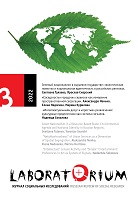Репрессии и эмансипации социалистической законности: производственный товарищеский суд в годы первых пятилеток
Repressions and Emancipations of Socialist Legality: Industrial Comrades’ Courts during First Five-Year Plans
Author(s): Maria StarunSubject(s): Economic history, Political history, Recent History (1900 till today), History of Communism
Published by: Центр независимых социологических исследований (ЦНСИ)
Keywords: Socialist Legality; Comrades’ Courts; USSR; Law; Gabriel Gatti; armed conflict; world(s) of victims; peacebuilding; re key; Discipline; Industrialization; Trade Unions; Communist Party;
Summary/Abstract: This article examines two simultaneous and contradictory aspects of socialist legality: its repression and emancipation. The author investigates one particular institution of socialist legality - comrades’ courts in the workplace - in order to discover the interweaving of these two functions of Soviet justice. The article argues that the flexibility of socialist legality is one of its basic and defining features, which could provide an emancipatory space of struggle for rights and criticism of the system, on one hand, and a purely repressive, restrictive effect, on the other. It was not the actual legislation that determined the functioning of legality but the interaction of that legislation with the environment, which often subordinated not only the a priori broad procedures of Soviet law but also the essence of the law, which was exposed to interpretations. The author demonstrates that the operation of comrades’ courts depended on many factors: the authority and independence of the local Communist Party and trade union cells; the presence of activists; the industrial environment of interaction; the interests of the courts’ organizers; government campaigns; and so on. In practice, comrades’ courts as one of the loci of socialist legality accommodated a wide range of their own autonomous tactics, among which one can detect bureaucratic (abundance of fines, existence of particular courts only on paper), repressive (control over disciplining of and providing for workers), and emancipatory (protection of honor and dignity in the workplace, criticism of administration, struggle for better working conditions through drawing attention to disorder in the organization). Such broad contexts and interpretations available in comrades’ courts demonstrate the broad scope of socialist legality, the realization of which in each individual case depended on the context and occurred in its own unique way.
Journal: Laboratorium. Журнал социальных исследований
- Issue Year: 14/2022
- Issue No: 3
- Page Range: 87-118
- Page Count: 32
- Language: Russian

